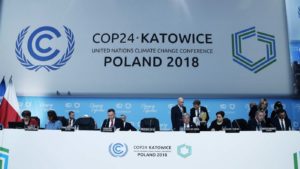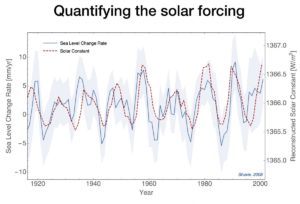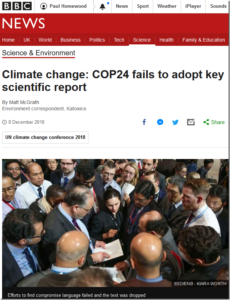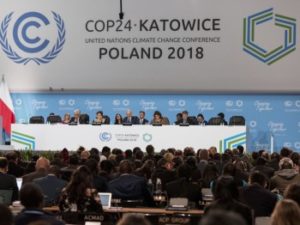by Bjorn Lomborg, December 6, 2018 in CAPX
The climate summit in Poland has been given a boost in recent weeks by well-timed climate change reports shaping the news agenda. But if we dig deeper than most of the media did, these reports demonstrate what is wrong with global warming policy discussion.
…

by Samuele Furfari, 20 décembre 2018 in Contrepoints
La COP24 est enfin terminée et, comme à chaque fois, sans aucun résultat concret pour la diminution des émissions de CO2 malgré les cris d’alarmes des ONG environnementales, du Secrétaire général des Nations Unies et des foules de citoyens. Et pourtant dans un an, on va de nouveau nous bassiner les oreilles avec la 25ème COP tandis qu’on observera encore une fois l’augmentation des émissions. Comme à chaque fois, par l’entremise des media, on nous rappelle que notre planète va devenir un enfer comme Vénus, que le niveau de la mer va nous engloutir et que la biodiversité va disparaître.
Rappelons tout d’abord ce fait : aujourd’hui l’Union Européenne ne représente que 11 % des émissions mondiales de CO2, la Chine 28 %, les États-Unis 15 %, l’Inde 7 %, la France 1 % et la Belgique 0,4 %.
…
by P. Homewood, December 18, 2018 in NotaLotofPeopleKnowThat
Negotiators in Poland have finally secured agreement on a range of measures that will make the Paris climate pact operational in 2020.
Last-minute rows over carbon markets threatened to derail the two-week summit – and delayed it by a day.
Delegates believe the new rules will ensure that countries keep their promises to cut carbon.
The Katowice agreement aims to deliver the Paris goals of limiting global temperature rises to well below 2C.
“Putting together the Paris agreement work programme is a big responsibility,” said the chairman of the talks, known as COP24, Michal Kurtyka.
“It has been a long road. We did our best to leave no-one behind.”
…
by Dr Shaviv, December 7, 2018 in ScienceBits
Three minutes is not a lot of time, so let me be brief. I’ll start with something that might shock you. There is no evidence that CO2 has a large effect on climate. The two arguments used by the IPCC to so called “prove” that humans are the main cause of global warming, and which implies that climate sensitivity is high, are that: a) 20th century warming is unprecedented, and b) there is nothing else to explain the warming.
These arguments are faulty. Why you ask?
We know from the climate-gate e-mails that the hockey stick was an example of shady science. The medieval warm period and little ice ages were in fact global and real. And, although the IPCC will not admit so, we know that the sun has a large effect on climate, and on the 20th century warming in particular.

In the first slide we see one of the most important graphs that the IPCC is simply ignoring. Published already in 2008, you can see a very clear correlation between sea level change rate from tide gauges, and solar activity. This proves beyond any doubt that the sun has a large effect on climate. But it is ignored.
…
by Rémy Prud’homme, décembre 2018, in MythesManciesMath.
La COP est une conférence internationale qui depuis 24 ans tient chaque année la réunion de la dernière chance pour sauver la planète. Vous croyez peut-être que la planète avait été sauvée lors de la COP21 à Paris. Erreur. Tout reste à faire. C’est ce qui justifie la COP24, qui se tient cette année en Pologne. Le secrétariat de la COP24 publie en ligne la liste de ses participants, sur près de 1100 pages.
Plus de 21 000 participants. Sans compter les 1500 journalistes accrédités, qui sont rémunérés par leurs médias, pas par les contribuables. Ces 21 000 participants sont pour 14000 des délégués des gouvernements, et pour 6000 des représentants d’ONGs prétendument intéressées et compétentes. (Le solde est composé de membres d’organisations du système des Nations-Unies).
Le coût de la fête est élevé. Les seuls frais de déplacement et de séjour pour cette COP de 15 jours s’élèvent sans doute (sur la base de 10000 € par participant) à plus de 200 millions d’euros. On pourrait y ajouter le coût du temps passé par les participants. S’ils y passent en moyenne une semaine, cela fait 21000 semaines, soit environ 500 personnes-années. A 50000 euros/an, 25 millions d’euros, qui s’ajoutent aux frais de déplacement. C’est de quoi doubler le niveau de vie annuel de 2 ou 3 millions d’enfants au Malawi.
…
by F. Vahrenholtz & S. Lüning, 12 décembre 2018 in Contrepoints
Un article de NoTricksZone
La conférence sur le climat de Katowice bat son plein et diverses initiatives visant à réduire les émissions de dioxyde de carbone sont à l’ordre du jour : manger moins de viande, se chauffer moins, prendre moins l’avion. Dans ce dernier cas, bien sûr, la conférence confine elle-même à l’absurde.
Il aurait été facile de transformer la conférence en une réunion sur Internet avec retransmission en direct et commentaires en ligne. Mais il aurait manqué quelque chose à ce long et merveilleux voyage d’affaires avec ses réceptions, ses indemnités journalières et ses réunions d’avant Noël entre sauveteurs du climat. Cette fois-ci, plus de 22 000 participants se sont rendus en Pologne, la plupart confortablement en avion. Les délégations les plus nombreuses à la Conférence sur le climat venaient d’Afrique.
La Guinée envoie 406 délégués cette année, la République démocratique du Congo y est présente avec 237 participants et la Côte d’Ivoire envoie 191 ressortissants en Pologne. La liste des participants est disponible sur la page d’accueil de la conférence en format pdf et compte 1084 pages.
…
by P. Homewood, December 9, 2018 in NotaLotofPeopleKnowThat
Attempts to incorporate a key scientific study into global climate talks in Poland have failed.
The IPCC report on the impacts of a temperature rise of 1.5C, had a significant impact when it was launched last October.
Scientists and many delegates in Poland were shocked as the US, Saudi Arabia, Russia and Kuwait objected to this meeting “welcoming” the report.
It was the 2015 climate conference that had commissioned the landmark study.
…

…
by David Wojic, December 5, 2018 in ClimateChangeDispatch
The mainstream press coverage of the beginning of the Katowice climate summit is sad but fascinating.
There is a uniformly dogmatic sense of urgency based on fear, with very little news and a great deal of preaching.
Fear is the dominant theme.
I truly pity the people who hold these false beliefs, as they must be afraid of the future. But I am not sympathetic with the alarmism, because it makes people dangerous.
The preachers are calling on the faithful to change the world we live in, and not in a good way. Fear makes people angry and angry people are dangerous.
Here are just three examples of alarmist news coverage of the Katowice climate summit, a few among many.
…

by M. Bastach, December 4, 2018 in WUWT
The U.N.’s climate summit will emit as much carbon dioxide as more than 8,200 American homes.
-
It’s also equivalent to more than 11,700 cars driving for one year or 728 tankers trucks worth of gasoline.
-
When air travel is factored in, the summit’s emissions are likely higher, according to one expert.
-
…

by Julian Wettengel, November 28, 2018 in Euractiv
Germany’s task force on planning the definite phase-out of coal-fired power production has scrapped plans to present a decision before the end of this year.
Several days after three eastern German federal states had demanded better and more detailed plans to support coal mining regions, the so-called coal commission has decided to “conclude its work on 1 February 2019”.
The task force set up a working group from its ranks to draw up further concrete proposals for coal regions and to hold talks on these with both the federal and state governments, the commission said in a press release.
…
La géologie, une science plus que passionnante … et diverse





